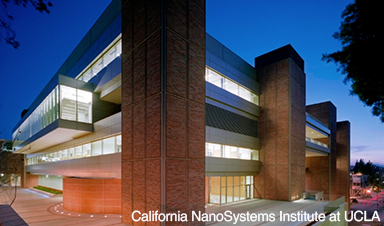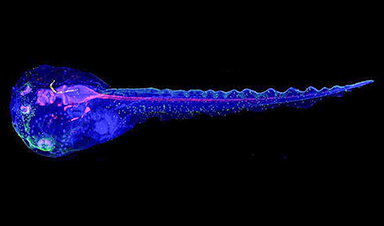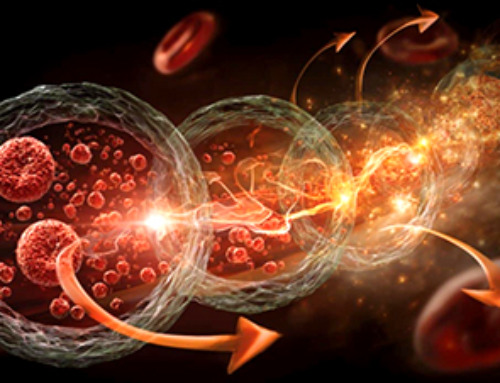For about one in 13 children in the U.S., normally harmless foodstuffs such as milk, eggs and peanuts can send the body’s natural defenses into overdrive.
Symptoms of food allergies can vary widely, but at worst, a systemwide allergic response can lead to anaphylaxis, a life-threatening condition characterized by a sudden drop in blood pressure and difficulty breathing.
Although there are now some preventive measures for food-induced anaphylaxis, there are not yet any long-lasting solutions—treatments capable of locking the immune system into a state of tolerance, so that it doesn’t respond to allergens.
Now, a UCLA research team has developed a possible way to impart long-term relief from allergies by inducing an active state of immune tolerance.
The technology uses a nanoparticle—a particle so small that it’s measured on the scale of billionths of a meter—to deliver proteins to specific cells in the liver. Those proteins may trigger an allergic response in other organs in the body, but in the liver, they cause the targeted cells to activate a tolerant immune response that switches the allergic response off.
A report on the research, published in ACS Nano, indicates that the platform is effective in preventing allergic reactions to an egg protein when ingested or inhaled. The UCLA researchers also showed that delivering a single piece of a protein that triggers allergies is sufficient to ameliorate the allergic reaction.
“Huge numbers of people suffer from food allergies, amounting to billions of dollars in annual health care costs,” said co-corresponding author Dr. André Nel, director of the University of California’s Center for Environmental Implications of Nanotechnology, or CEIN, and director of research at the California NanoSystems Institute at UCLA. “Normally, asthma and anaphylaxis are treated with an EpiPen syringe as well as anti-inflammatory and immune-suppressive drugs that only provide transient relief. For the problem to go away long-term, we’re looking at the liver to reprogram the immune system to an actively sustained state of nonresponsiveness.”
The liver is an immune-privileged organ, meaning that it is programmed not to respond to foreign proteins called antigens, which can cause allergic or anaphylactic responses elsewhere in the body. The platform developed by Nel and his colleagues spurs the liver to produce regulatory T cells, cells in the immune system that can go everywhere in the body, to calm allergic responses to food allergens.
Image Credit: University of California, Los Angeles
Post by Amanda Scott, NA CEO. Follow her on twitter @tantriclens
Thanks to Heinz V. Hoenen. Follow him on twitter: @HeinzVHoenen
News
AI matches doctors in mapping lung tumors for radiation therapy
In radiation therapy, precision can save lives. Oncologists must carefully map the size and location of a tumor before delivering high-dose radiation to destroy cancer cells while sparing healthy tissue. But this process, called [...]
Scientists Finally “See” Key Protein That Controls Inflammation
Researchers used advanced microscopy to uncover important protein structures. For the first time, two important protein structures in the human body are being visualized, thanks in part to cutting-edge technology at the University of [...]
AI tool detects 9 types of dementia from a single brain scan
Mayo Clinic researchers have developed a new artificial intelligence (AI) tool that helps clinicians identify brain activity patterns linked to nine types of dementia, including Alzheimer's disease, using a single, widely available scan—a transformative [...]
Is plastic packaging putting more than just food on your plate?
New research reveals that common food packaging and utensils can shed microscopic plastics into our food, prompting urgent calls for stricter testing and updated regulations to protect public health. Beyond microplastics: The analysis intentionally [...]
Aging Spreads Through the Bloodstream
Summary: New research reveals that aging isn’t just a local cellular process—it can spread throughout the body via the bloodstream. A redox-sensitive protein called ReHMGB1, secreted by senescent cells, was found to trigger aging features [...]
AI and nanomedicine find rare biomarkers for prostrate cancer and atherosclerosis
Imagine a stadium packed with 75,000 fans, all wearing green and white jerseys—except one person in a solid green shirt. Finding that person would be tough. That's how hard it is for scientists to [...]
Are Pesticides Breeding the Next Pandemic? Experts Warn of Fungal Superbugs
Fungicides used in agriculture have been linked to an increase in resistance to antifungal drugs in both humans and animals. Fungal infections are on the rise, and two UC Davis infectious disease experts, Dr. George Thompson [...]
Scientists Crack the 500-Million-Year-Old Code That Controls Your Immune System
A collaborative team from Penn Medicine and Penn Engineering has uncovered the mathematical principles behind a 500-million-year-old protein network that determines whether foreign materials are recognized as friend or foe. How does your body [...]
Team discovers how tiny parts of cells stay organized, new insights for blocking cancer growth
A team of international researchers led by scientists at City of Hope provides the most thorough account yet of an elusive target for cancer treatment. Published in Science Advances, the study suggests a complex signaling [...]
Nanomaterials in Ophthalmology: A Review
Eye diseases are becoming more common. In 2020, over 250 million people had mild vision problems, and 295 million experienced moderate to severe ocular conditions. In response, researchers are turning to nanotechnology and nanomaterials—tools that are transforming [...]
Natural Plant Extract Removes up to 90% of Microplastics From Water
Researchers found that natural polymers derived from okra and fenugreek are highly effective at removing microplastics from water. The same sticky substances that make okra slimy and give fenugreek its gel-like texture could help [...]
Instant coffee may damage your eyes, genetic study finds
A new genetic study shows that just one extra cup of instant coffee a day could significantly increase your risk of developing dry AMD, shedding fresh light on how our daily beverage choices may [...]
Nanoneedle patch offers painless alternative to traditional cancer biopsies
A patch containing tens of millions of microscopic nanoneedles could soon replace traditional biopsies, scientists have found. The patch offers a painless and less invasive alternative for millions of patients worldwide who undergo biopsies [...]
Small antibodies provide broad protection against SARS coronaviruses
Scientists have discovered a unique class of small antibodies that are strongly protective against a wide range of SARS coronaviruses, including SARS-CoV-1 and numerous early and recent SARS-CoV-2 variants. The unique antibodies target an [...]
Controlling This One Molecule Could Halt Alzheimer’s in Its Tracks
New research identifies the immune molecule STING as a driver of brain damage in Alzheimer’s. A new approach to Alzheimer’s disease has led to an exciting discovery that could help stop the devastating cognitive decline [...]
Cyborg tadpoles are helping us learn how brain development starts
How does our brain, which is capable of generating complex thoughts, actions and even self-reflection, grow out of essentially nothing? An experiment in tadpoles, in which an electronic implant was incorporated into a precursor [...]





















